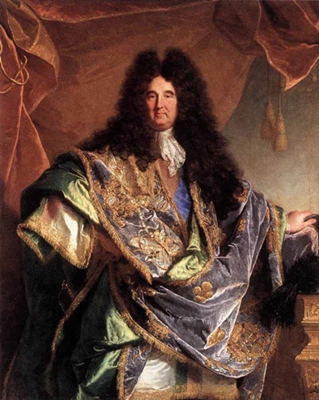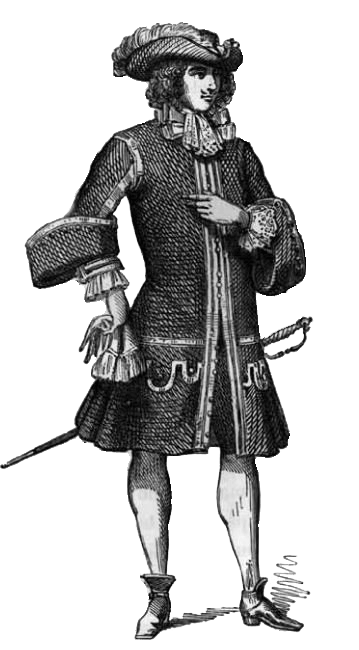Dangeau’s Diary, December 1687

1st. — Marly. The King remarked, that so many persons had desired to accompany him to Marly, that if the chateau had been as large as that of Fontainebleau, they could not all be accommodated. He said to Monsieur de Metz, whom he esteems very much: “Others desire me to bring them with me to Marly, and I desire you to come.”
2d. — Marly. The King went out shooting and returned early. Play commenced in the shops, in which there were the most beautiful stuffs, linens, and jewellery. There was also a bank. High play took place before and after the ballet, which began at half-past six o’clock. The King was much amused at the spectacle, and laughed very heartily at the comedy.
3d. — The King told us, while at his dinner, that Monsieur de Lavardin had entered Rome on the 15th of November, without any person appearing to oppose his entry. A few days after, the Cardinal d’Estrees asked the Pope’s permission to propose a bishopric for Portugal, of which he is the patron: the Pope said to him: “I absolve you.” “Holy father,” replied the Cardinal, “I have not incurred censure, and therefore do not ask for absolution.” “I give it you,” said the Pope; “propose your bishopric.” None but Cardinal Maldakin has seen the ambassador. But the greater part had left Rome before his arrival. A few days after his entry, he sent to request an audience of the Pope, who replied that he would give an answer when he found himself better. Cardinal Mollini, who has been nuncio in Spain, took the liberty of representing to the Pope, that he was very wrong in hesitating to give audience to an ambassador of his most Christian Majesty and that it was commencing by offending a great monarch. This judicious advice, however, operated no change in the Pope.
4th. — The Dauphine arrived before five o’clock. There was much play in the shops, the bank notes were quite exhausted, and the comic ballet of the Bourgeois Gentilhomme commenced at six o’clock, in order that supper might be served up earlier than usual, and that all the servants might get their meals before midnight. Madame d’Armagnac, having returned home from being present at the marriage of Monsieur de Tonnerre, was very near being robbed, by a man who had slipped into her wardrobe and had demanded her jewels from one of her women, who, very adroitly, gave the thief a paste necklace and so frightened him, that the rascal, to save himself, jumped out of the window, thinking he was discovered.
8th. — Monsieur de Brion, who, a few months since, married Mademoiselle de La Force, formerly maid of honour to the Queen, has consented to allow his father to dissolve the marriage, and, by this means, he quits Saint-Lazare, in which he had been confined by his father, the president de Brion. She no longer bears the name of Madame de Brion. The Duc de La Force has arrived here, to speak to the King, in favour of this unfortunate creature and the King has promised to interest himself for her.
11th.— Monsieur de Lauzun had requested Monsieur to obtain him permission from Mademoiselle to see her again. Mademoiselle answered Monsieur, who spoke to her on the subject, that Monsieur de Lauzun was an ungrateful man; that she would not see him and that she would have given the world never to have seen him. Monsieur approved much of Mademoiselle’s answer, who added, “I know his intention. He hopes, if I saw him again, that I would speak to the King, to obtain his recall to court, but I will, on no account whatever, pronounce his name. He does not deserve it.”
17th. — This evening there was a French comedy. It was performed very badly. All the good actors have remained in Paris, in order to play a new comedy, written by Baron. It is called Le Jaloux. There is much dissatisfaction here that the worst comedians should have come to perform.
19th. — The Duchesse de Choiseul has again appeared at court, but she will not see the Princess de Conti. The King had even forbidden the Princess de Conti to speak to her in case she should meet her, saying to her, “Do not trouble yourself to find reasons for not speaking to her: say that I have commanded it. Place it all on my shoulders. I have a broad back.”
22d. — We are informed, by letters from Girardin, the King’s ambassador at Constantinople, that on the 8th of November, the Grand Seignior was deposed and imprisoned and that his brother, who had been incarcerated for forty years, had been placed upon the throne. He is only six months younger than his brother. Chiaoux Bassi, who headed the revolt, has been made grandvizier, and his brother-in-law, Coprogli, caimacan. This Coprogli is the son and grandson of the Coproglis of whom so much has been said. Two hours after the revolt, and the imprisonment of the Grand Seignior, all was as quiet and tranquil at Constantinople, as if nothing had happened. The late Grand Seignior being forty-seven years of age, his brother told him, he, in his turn, would keep him forty years in prison.
23d. — We have learnt that Monsieur de Turenne, returning from the Morea, in a Venetian vessel of considerable size, met a small French vessel, that he sent to compliment the commander of the vessel, who replied that he would attack the Venetian, unless it saluted. Monsieur de Turenne sent to beg they would wait a moment, got into a cutter, and went on board the French vessel, in order to take part in the action, should it attack the Venetian, but the latter acted discreetly, and performed the salute. This conduct of Monsieur de Turenne has been much commended.
26th. — Monsieur de Croissy has declared to the nuncio, that the King, being guarantee for the treaty of Pisa, could no longer refuse supporting the rights of the Duc de Parma, to whom his Majesty has been obliged to give up Castro and Ronciglione, in consideration of the sum of eight hundred thousand livres, which Monsieur de Parma had carried to Rome several times, and the Pope had declined to receive. The nuncio replied, that his Majesty could not observe that treaty, because Castro had cost the ecclesiastical state more than twenty millions of livres. Monsieur de Croissy rejoined, that when Popes made unjust wars, it was but right that they should pay dearly for them and that the treaties which had been entered into must be observed, especially that to which his Majesty is guarantee. Monsieur de Croissy moreover declared to him, that Avignon had been given to the Popes in violation of the laws of the kingdom that his Majesty’s predecessors and himself had not been anxious to enter upon their rights, because they wished to favour the Popes with whom they had reason to be satisfied, but that now the Pope treats the King in a manner which compels his Majesty no longer to observe the same condescension and that, therefore, the parliaments of the kingdom shall pronounce upon the affair, and, after the declaration of their decision, the King will enforce the execution of the decree.


